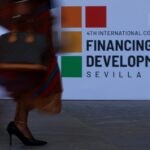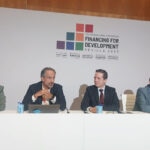BBVA channeled €27 billion into the sustainable business of its emerging markets in 2024
In 2024, BBVA channeled €27 billion to boost the sustainable business and fund development projects in its emerging markets (Mexico, South America and Turkey), which represents a 60 percent increase over 2023. Meanwhile, the BBVA Microfinance Foundation allocated €1.5 billion in lending to vulnerable entrepreneurs in 2024.

The €27 billion mobilized by BBVA in 2024 in these emerging economies includes both financing for social, educational and health infrastructure, as well as projects related to climate change, as well as support for entrepreneurs and startups, and the financial inclusion of disadvantaged groups.
BBVA is providing these figures in the framework of the 4th International Conference on Financing for Development (FFD4), organized by the UN in Seville, June 30 - July 3. Experts from BBVA and the BBVA Microfinance Foundation participated in the event where they stressed the need to promote the energy transition in emerging economies and boost development funding.
In one of the sessions organized by the World Economic Forum, Iván Poza, Head of the Public Sector at BBVA, advocated for implementing formulas to scale up private investment in climate solutions in countries with the greatest needs in their energy transition. Poza underscored “the key role banks play in channeling resources to adaptation and mitigation projects, and the need to create stable regulatory frameworks that blend public and private capital.”
With an audience of finance ministers from Colombia and Ecuador, and the heads of multilateral organizations (the Development Bank of Latin America and the Caribbean and the Inter-American Development Bank) and representatives of investment funds, Poza provided concrete examples of how sustainable financing can support climate, social and economic resilience in Latin America.

Left to right: Avinash Persaud (BID); Iván Poza, Sector Head of Public Institutions at BBVA; Jaime Díaz (CABEI) & Ignacio Corlazzoli, Development Bank of Latin America.
Meanwhile, the Global Head of Sustainability Intelligence at BBVA, Antoni Ballabriga, argued for “moving toward a more inclusive financial architecture that takes into account the asymmetries between developed and developing countries.” In his view, “it is essential for the financial industry to integrate principles of equity and social cohesion into product and strategy design. BBVA is working on internal standards related to social issues, and the development of personalized solutions for different groups of the population,” he said.
He also stressed that “the systemic transformation to mobilize private capital at the scale we need represents a great opportunity, and it will only take place if it makes sense from a financial standpoint.” In his opinion, “unblocking large-scale blended financing is vital. For every dollar of multilateral investment today, only €0.50 of private capital is mobilized. It is essential for multilateral banks to prioritize not just the sustainable finance they provide directly, but above all, the mobilization of private capital they enable through guarantees and large-scale first-loss mechanisms with streamlined processes.”

Left to right: Iván Poza, Sector Head of Public Institutions at BBVA; Cristina Sánchez UN Global Compact Spain Executive Director ; Sanda Ojiambo, UN Global Compact CEO ; Antoni Ballabriga, Global Head of Sustainability Intelligence at BBVA; Gabriela Eguidazu, Innovation and Inclusive Growth director at MFBBVA; Clara Arpa, UN Global Compact Spain President.
BBVA also participated in other technical meetings with international leaders, representatives of multilateral institutions and experts from the non-governmental sector, where the bank reaffirmed its commitment to actively contribute to the design of innovative financial instruments for sustainable development.
BBVA Microfinance Foundation: innovation, technology and impact
"Financing the development of vulnerable entrepreneurs is much more than offering them financial products and services. They need comprehensive solutions, those that not only improve their businesses, but also their health, home and access to education,” said the Director of Impact Measurement and Strategic Development at the BBVA Microfinance Foundation (FMBBVA), Stephanie García Van Gool.

Stephanie García Van Gool, Director of Impact Measurement and Strategic Development at the BBVA Microfinance Foundation (FMBBVA), during her speech.
In a session organized by the United Nations Environment Programme - Finance Initiative (UNEP FI), the Director of Innovation and Inclusive Growth at the FMBBVA, Gabriela Eguidazu, emphasized “the use of technology and data to expand financial inclusion through mobile banking, generative artificial intelligence and digital training platforms, with a focus on the individual needs of every entrepreneur.”
The FMBBVA established its position as a global benchmark at this International Conference on Financing for Development. Since its creation in 2007, FMBBVA institutions in five Latin American countries have served over six million low income entrepreneurs, providing over €18.8 billion in loans for their advancement. These entrepreneurs, in a situation of socioeconomic vulnerability, require financing and specific support to escape poverty. The FMBBVA uses Oxford University’s multidimensional poverty methodology to design products such as micro health insurance or loans to improve housing.
Furthermore, the FMBBVA participated in side events during the process of preparing the FFD4, such as the seminar ‘Financing development with a feminist approach’, where Laura Fernández Lord, Head of Sustainability, Equity and Inclusion, noted that 63 percent of the entrepreneurs supported by the foundation are women.
FFD4, a key forum to reconsider development financing
The 4th International Conference on Development Financing (FFD4) brought together over 50 heads of state and government representatives. It included official sessions, side meetings and the International Business Forum, where economic, political and social leaders discussed transformative initiatives.
The FFD4 continues the legacy of Monterrey (2002), Doha (2008) and Addis Ababa (2015), consolidating the key role of the financial system in the face of challenges like the climate and geopolitical crisis. The Sevilla Commitment, ratified by 192 countries, outlines a roadmap with 130 concrete initiatives to mobilize $4 trillion annually for sustainable development. This agreement is strategic for the financial and business sectors, as it promotes green bonds, blended financing, transparency, and public-private partnerships, especially in support of SMEs.
Its three strategic pillars include the mobilization of large-scale investments (promoting blended financing, loans in local currency and increasing the lending capacity of multilateral development banks); debt management (creating a global center for debt-for-development swaps and an alliance for debt payment grace periods); and reforming the financial architecture (supporting country-led platforms and adopting measures that take vulnerability into account beyond GDP).